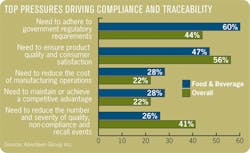Food and Beverage Manufacturers Trail in Technology Adoption
March 1, 2009
3 min read
This sector insight will highlight some critical areas that F&B manufacturers need to focus on to successfully close this gap. The top pressure driving the F&B industry to focus on compliance and traceability issues is the need to adhere to government regulatory requirements.The second most prevalent pressure for F&B manufacturers, which is the top pressure for the overall survey population, is the need to ensure product quality and consumer satisfaction. This is obvious, given the state of media coverage and public opinion in regard to food safety. F&B manufacturers are under greater public scrutiny as an industry, and are therefore required to ensure higher product quality and customer satisfaction.To address these pressures, F&B manufacturers are building compliance and traceability into the production process. Building in compliance and traceability is a two-fold strategy. First, it involves gaining understanding and control of the production process itself. Compliance and traceability cannot be assured simply by testing at the end of a production process. Instead, it must be assured through continuous monitoring of the process itself.Secondly, it requires manufacturers to have the ability to recreate manufacturing conditions and trace back from manufacturing conditions to supplier performance, as well as product development. While F&B manufacturers are establishing the right strategy, they are not able to execute the strategy as effectively as best-in-class companies.Gaining visibilityOne of the main reasons behind F&B manufacturers' lagging performance is their lack of real-time visibility. Best-in-class manufacturers are taking a two step strategy to improve visibility in their manufacturing operations. First, they are automating the collection of quality data across operations and are gaining real-time visibility into supplier quality performance. The second step taken by best-in-class manufacturers is to effectively use the data collected for decision making.All of these attributes, when taken together, assure real-time visibility both into the production process and across the value chain, enabling manufacturers to become more responsive to non-conformance incidents. Best-in-class manufacturers are enabling all of the capabilities discussed above by adopting technology at different levels of the manufacturing operation. Adopting manufacturing execution systems (MES) and quality management system (QMS) technologies enable manufacturers to improve visibility and ensure quality, compliance and traceability initiatives across the enterprise. Supply chain management (SCM) solutions are critical to extend the scope of quality by gaining control of supplier quality through SCM and QMS solutions. Best-in-class companies are taking their technology investments a step further by establishing real-time interoperability between MES and QMS, as well as QMS and enterprise resource planning (ERP) systems.Aberdeen recommends that manufacturers automate collection of quality data from the plant floor and suppliers. They should also leverage real-time data to provide role-based actionable intelligence, as well as analytical capabilities for predictive insights. F&B manufacturers are lagging in technology adoption. They should invest in MES, QMS and SCM applications and establish real-time interoperability to improve visibility and ensure quality, compliance and traceability initiatives across the enterprise.Matthew Littlefield, [email protected], is Senior Research Analyst, and Mehul Shah, [email protected], is Research Analyst, at Aberdeen Group Inc., in Boston.
About the Author
Matthew Littlefield
Nuris Ismail
Sign up for our eNewsletters
Get the latest news and updates

Leaders relevant to this article:
